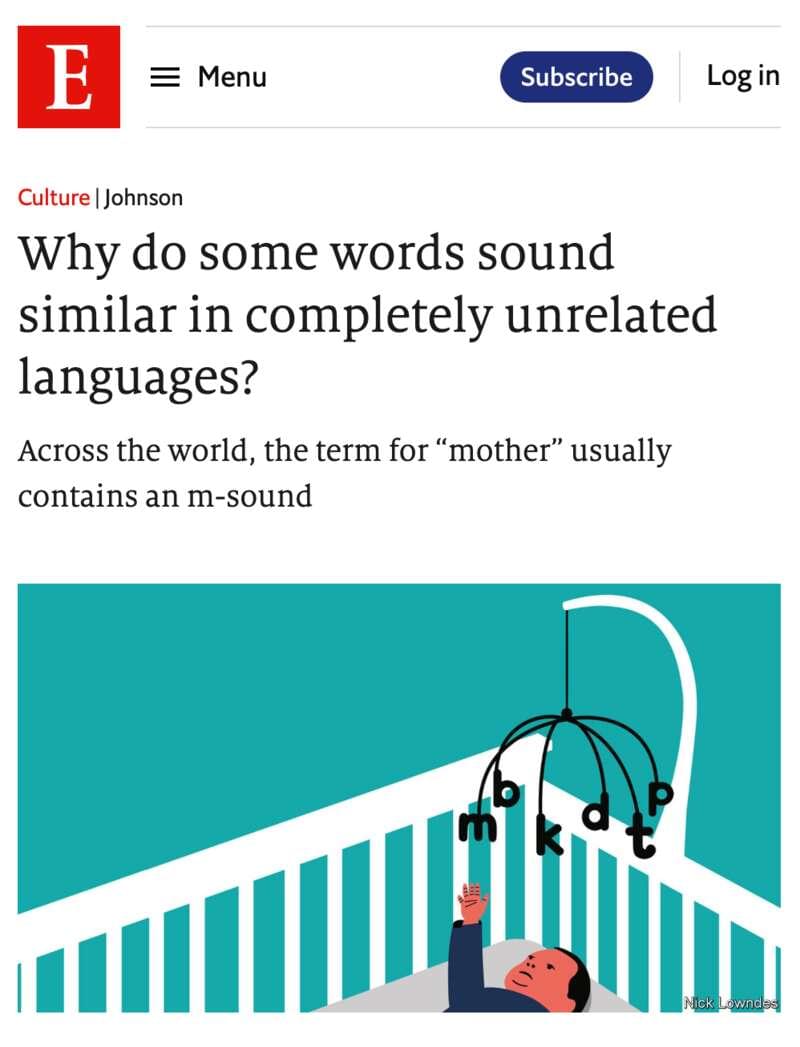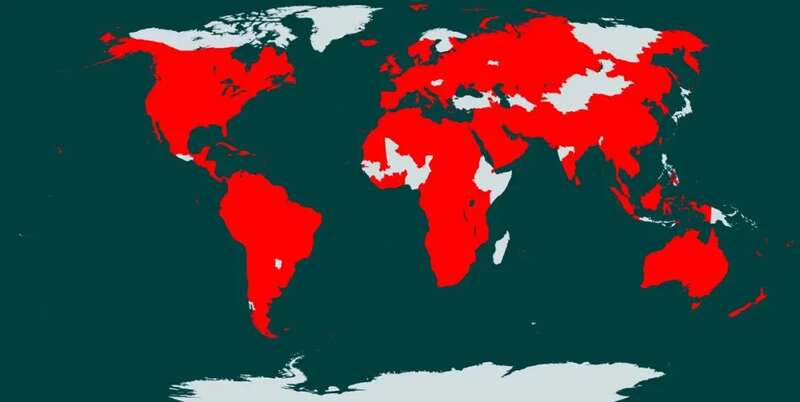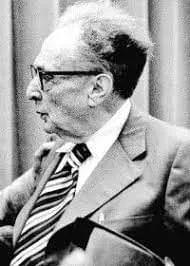
文章的副标题是 Across the world, the term for “mother” usually contains an m-sound(全世界,“母亲”这个词往往含有“m”的发音)。
一开头,文章给我们展示一张地图,标记了世界上所有“妈妈”这个词带有 m 音的语言,结果大部分地区都被标成了红色。

文章这样评价:
It puts old maps of defunct empires to shame; scores of countries are shaded red.(数十个国家都被标成红色,这让(疆域辽阔的)古代帝国汗颜。)
接下来文章开始分析为啥很多语言中“妈妈”一词都带有 m 音。
作者认为所有语言都有一个共同的特征:
some sounds are more widespread than others around the world(有些发音在世界上更加普遍)
比如b, m, p, t, d and k,因为这些辅音容易发音。
下面这段非常关键:
A baby vocalising will, at first, make a vowel-like sound, usually something like “ah”, which requires little in the way of control over the mouth. If they briefly close their mouth and continue vocalising, air will come out of their nose, thus making the m-sound that is used in “mother” around the world.
译:婴儿在发声时,一开始会发出类似元音的发音,例如“啊”,这对控制嘴巴几乎没有什么要求。如果他们很快地合上嘴巴、继续发音,空气就会从他们的鼻子里出来,从而发出“m”的音,这就是全世界人说“母亲”时会用到的声音。
简而言之,世界上很多语言“妈妈”带有 m 音,是因为——“ma”是最轻松、最好发的音。

另外,作者还提到了“爸爸”发音在全世界也比较相似的原因:
Babies can easily stop their breath when they close their lips. This produces a b- or a p-sound. It is surely for this reason that so many names for “father” use these consonants: papa in English, abb in Arabic and baba in Mandarin.
译:婴儿闭上嘴巴的时候,很容易暂停呼吸。这一动作就会产生出“b-”或“p-”的声音。正是由于这个原因,许多表示“父亲”的叫法都包含这些辅音:英语中的“papa”,阿拉伯语中的“abb”,普通话中的“baba”。
我们都知道英文中关于“爸爸”和“妈妈”的正式名称是 father(父亲) 和 mother(母亲),这两个单词挺难念,中间还有咬舌音,父母不会教孩子从小发这两个音,毕竟一个孩子至少到7岁以上,才能准确地发出这些音节。
所以教孩子从小说“mama”、“baba”是最轻松省事儿的方式,各个语言都一样。
最后作者揭示了一个令我感到脑洞大开的真相:
说有一位俄罗斯的语言学家 Roman Jakobson(罗曼·雅各布森)指出:

Babies are cooing and babbling to practise the use of their vocal apparatus. It is the parents, desperate to communicate, who identify those early sounds as the baby’s “names” for them.
译:婴儿牙牙学语时,只是在练习使用他们的发声器官。正是急于跟婴儿沟通的父母,把这些“婴语”当作对自己的称呼。
所以,并非世界各地的婴儿把父母称为“baba”、“mama”,而是急于跟婴儿沟通的父母们,把婴儿练习发声时最简单的发音——“baba”、“mama”定成对自己的称呼。
高能预警,文章最后一段升华了,很温情、感人:
It is hard to find linguistic universals amid the world’s dazzling variety. It is heartwarming to find a commonality embedded in another universal: the love that babies inspire in their mamas and their papas.
*universal: n.(语言学)共性(=commonality)
译:在纷繁复杂的世界中找到语言的共性,实属不易。不过,语言存在另一种维度上的共性——那便是婴儿唤起的父爱和母爱。
我想,正是这样的爱,让人类文明星火不灭、代代相传。

想起诺兰《星际穿越》里的一句名著名台词:Love is the one thing that transcends time and space.
最后用这篇文章祝天下的母亲,节日快乐!
Happy Mother’s Day!

